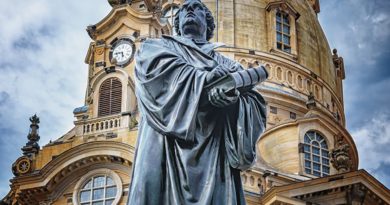Separation of Church and State: A Case of Reverse Engineering
By Pastor Sam Jones
As a Baptist, the phrase “separation of church and state” is not at all foreign to me.
This phrase is one of the Baptist distinctives, but what exactly does it mean? This phrase is common in our culture and is often used to proclaim that the church should stay out of the state’s business.
In this article, it is my aim to define the phrase “separation of church and state” from the phrase’s original intent and doctrinal background.
The term has been coined from Thomas Jefferson’s letter to the Danbury Baptist Association in 1802. In this letter Jefferson, a Founding Father who was the principal author of the Declaration of Independence and later served as the third President of the United States from 1801 to 1809, proclaimed:
“Believing with you that religion is a matter which lies solely between Man and his God, that he owes account to none other for his faith or his worship, that the legitimate powers of government reach actions only, and not opinions, I contemplate with sovereign reverence that act of the whole American people which declared that their legislature should ‘make no law respecting an establishment of religion, or prohibiting the free exercise thereof,’ thus building a wall of separation between Church and State. Adhering to this expression of the supreme will of the nation in behalf of the rights of conscience, I shall see with sincere satisfaction the progress of those sentiments which tend to restore to man all his natural rights, convinced he has no natural right in opposition to his social duties.”
Thomas Jefferson: No State-Run Church

It’s clear that the original intent of the phrase was to assure the Danbury Baptist Association that America would not have a state-run church.
This is quite different from how the phrase is used today. Today we have many who would have no problem with the state meddling in the churches’ business. Whether it is the censoring of sermons, forcing churches to perform weddings, or not allowing the endorsing of political candidates, it is quite clear that the secular culture, at large, has no problem with violating the conscience of the church and tearing down the “wall of separation between Church and State.”
Jefferson never intended this phrase to be used as handcuffs for the church, rather he intended this phrase to be handcuffs on the state. From the conception of the phrase, it was intended to keep at bay those who seek to control the church through the state.

As I mentioned, I’m a Baptist and this phrase is a Baptist distinctive, and I would like to see how it’s been used in Baptist doctrine. Edward T. Hiscox in his book, The New Directory for Baptist Churches, states:
“No organic union of Church and State should be tolerated, but entire separation maintained: The Church should neither ask for, not accept of, support from civil authority, since to do so would imply the right of civil dictation and control. The support of religion belongs to those who profess it. Christian men are to be good and law-abiding citizens, sustaining and defending the government under which they live, in all things not contrary to conscience and the word of God; while such government is bound to protect them in the full enjoyment of all their rights and privileges, both civil and religious.”
Separation of Church and State Should Keep the State from Controlling the Church

It’s clear from a historic position Baptists believe the separation of church and state is to be a separation that keeps the state from controlling the church. Hiscox even touched on the fact that Baptists believe in being active in government: “Christian men are to be good and law-abiding citizens, sustaining and defending the government…” and at times we must defend the government from those who would seek to destroy our republic from within.
Kevin Bauder in his book, Baptist Distinctives and New Testament Church Order, affirms the principles that Hiscox laid out by stating:
“Why are Baptists so strongly committed to the separation of church and state? Their first reason derives from the nature of true worship. Baptists believe that any devotion offered to God must come from the heart to be acceptable. Merely formal religious exercise is an offense to God and merit only judgment for those who practice them… Governmental threats can enforce external conformity, but they cannot secure the heart’s allegiance.”
Not only do Baptists believe the separation of church and state is to be a wall of separation keeping the state out of the churches’ business, they believe that if the state breaks this wall of separation it violates the individuals’ God-given right of “Soul Liberty.”
What is Soul Liberty?

From the conception of the phrase to the affirmation of doctrinal statements we can see that the separation of church and state was never to keep the Christian or Christian principles out of government, it was to keep the state out of the church.
Recently though, the phrase has been reverse engineered to mean the opposite of its original and historical intent. This reverse engineering has not only been done by the secular world it has been helped along by many pastors.
Crack the End-Times Code! Discover more about internationally-recognized prophecy expert and Fox News and History Channel commentator Paul Mcguire and Pulitzer Prize-nominated investigative journalist and Prophecy Investigators Founder and Editor-in-Chief Troy Anderson’s #1 bestselling FaithWords/Hachette book The Babylon Code: Solving the Bible’s Greatest End-Times Mystery at https://www.faithwords.com/titles/paul-mcguire/the-babylon-code/9781455589456, http://www.paulmcguire.us, or http://www.troyanderson.us.
Many pastors today, whether they would admit it or not, have embraced a form of Pietism. In their Pietism, they build a wall to separate the church from having an influence on the state. In removing the influence of the church upon the state they inherently destroy the wall of separation of church and state from its original meaning.
Simply put a culture’s worldview will always shape the relationship between the state and the church. To remove the influence of the church from the state always brings the influence of the state upon the church. From the conception of this nation, we can see the desire to not violate the right of religious freedom. This can only be done through the church having an influence on the state. Either the church will impact the state, or the state will impact the church, one will influence the other.
Where Do We Go from Here?

If you’re a Christian, I ask you to consider not only the historical use of the phrase “separation of Church and State”, I also ask you to consider the reasons God instituted government.
In Genesis 9:5-6, we see that God institutes government and he does it with the purpose to protect the innocent and punish wickedness. This principle is confirmed in Romans 13:3-4.
If you desire to see the government to be valid in its purpose, I encourage you to uphold the historical meaning of “separation of Church and State” by being a Christian influence on the government.
This article originally appeared on The Shining Light Ministries. Learn more: https://theshininglightministries.com/2018/06/07/separation%E2%80%8B-of-church-and-state/
Pastor Sam Jones currently serves as senior pastor at Faith Baptist Church in Hudson, Iowa. He also co-hosts The Shining Light Podcast (you can find it on iTunes, Worldview Weekend Radio, and https://theshininglightministries.com). Pastor Sam completed an intense pastoral internship at Hagerman Baptist Church and served as a chaplain at Heritage Care Center in Iowa Falls, Iowa before accepting the call to pastor at Faith Baptist Church in Hudson, Iowa. He loves people and his goal is to make disciples of Christ by personally, prayerfully, and persistently investing the Word of God into others.




